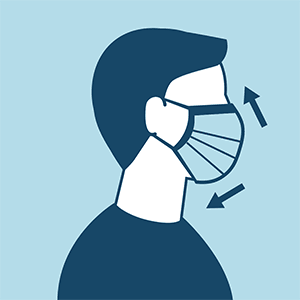 |
| Credit CDC |
#15,269
Six weeks ago the CDC finally came out with a recommendation for the public wearing of `face covers' to inhibit the spread of COVID-19 (see The CDC's Cloth Face Cover Recommendations), and for the first few weeks it seemed as if everyone was wearing one.
Today, not so much. At least where I'm living.Whether it is `mask fatigue', Florida's warmer weather making mask wearing uncomfortable, a political statement - or simply a lack of faith in their effectiveness - I'm seeing a lot more people out and about without any sort of face cover.
While the protective qualities of non N95 masks has been long disputed, those regions where mask wearing is de rigueur - like Taiwan, Hong Kong, South Korea, etc. - have reported far fewer COVID-19 cases, and enjoy a much lower mortality rate, than we've seen in the United States or Europe (see EID Journal (Letter): On The Wearing Of Face Masks In Public).Over the weekend, Hong Kong University - in advance of the publication of a report in Clinical Infectious Diseases - announced the results of a mask efficacy study that suggests surgical masks may be more effective in preventing transmission of the virus than previously believed.
Since the study hasn't been published yet, we don't have all of the details, but the experiments were summarized by Dr Yuen Kwok-yung of HKU at a press conference on Sunday (see 1 minute RTHK video clip below).
- When naive (unifected) hamsters were exposed to the air flow from an infected hamster's cage, 66% (10 of 15) became infected with COVID-19 after a 7 day exposure.
- When a surgical mask was placed at the outlet of the infected hamster's cage, that number dropped to just 16.6% (2 of 12).
- And when a surgical mask was place at the inlet of the naive hamster's cage, 4 or 12 (33.3%) were infected.
“In our hamster experiment, it shows very clearly that if infected hamsters or humans – especially asymptomatic or symptomatic ones – put on masks, they actually protect other people. That’s the strongest result we showed here,” Yuen said.SCMP also reported:
“Transmission [of the virus] can be reduced by 50 [percentage points] when surgical masks are used, especially when masks are worn by infected individuals,” he said.
The study also found that hamsters infected with Covid-19 via direct injection had more severe symptoms than those that contracted it through the mask partitions. The latter group experienced lower clinical scores, milder histopathological changes, and lower viral loads in respiratory tract tissues.This raises additional questions over whether a reduced viral load (due to mask wearing) might result in less severe illness (see SARS-CoV-2 viral load and the severity of COVID-19).
Some English language reports from Hong Kong include:
Masks prevent spread of coronavirus: HKU study 2020-05-17 HKT 21:21
Researchers from Department of Microbiology of HKU confirms that surgical masks can effectively reduce infection rate of COVID-19 by 41.7% by Dimsumdaily Hong Kong
Despite their limitations, I've long been an advocate of public mask wearing during a pandemic (see Any Mask In A Viral Storm?), and last January's The Man In The Ironed Mask Revisited), where we looked at the pros and cons of the general public making, and wearing, cloth masks.
Coronavirus: hamster research shows effectiveness of masks ‘huge’ in Covid-19 battle, Hong Kong scientists say
- Hamsters placed in adjoining cages with infected subjects were infected at a 66.7 per cent rate; the introduction of a barrier saw the percentage drop to 16.7
- ‘It shows very clearly that if infected hamsters or humans … put on masks, they actually protect other people,’ HKU’s Dr Yuen Kwok-yung says
While it may not be what the `cool kids' will be wearing this summer - bolstered by this study - I'm certainly going to be wearing face coverings in public for the foreseeable future.
